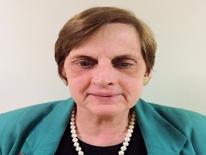
“What does the ADA mean to me? To respond to this question, let me take you back to a time before the Americans with Disabilities Act or ADA was enacted, when I was in high school and college. Even from earliest childhood, I have always been fascinated by languages and I currently speak Spanish and French. In high school and college in the late 60s and 70s, I applied for several study abroad programs, one a national student exchange program and the other a part of my university. Both programs rejected me because of my blindness and said so. “We don’t accept blind people here”. The first college I applied to did the same thing. Sometimes, when I think about it, I am amazed that I have had any career at all. I was able to later earn Fulbright and American Association of University Women graduate fellowships that permitted me to study abroad and complete my doctorate. But all of that notwithstanding, I can’t help but wonder how many people there were, pre-ADA, who were rejected from employment and educational opportunities because of their disabilities, who simply gave up and never tried again. It hurts to be rejected and it takes inner strength and support from friends, mentors and colleagues to overcome that rejection.
I remember how honored I felt in 1991 to be on the White House lawn when the ADA was signed into law. I was still somewhat new to Federal employment then and was not in Washington, DC in the 70s when the efforts to bring about the rehabilitation Act were taking place. During the ADA signing, I was struck by the importance of coalitions and how we as people with disabilities needed to then and need to now work with like-minded groups to advocate for change.
The ADA gave us the right of full participation in employment and education as well as access to public accommodation, transportation and telecommunications. Truly, disability rights are civil rights! The ADA did for the private sector what the Rehabilitation Act had earlier done for the Federal sector. But while we wish happy 30th to the ADA, let’s not sit back on our laurels.
Yes, we have come a long way, but we still have a way to go. People are living longer today and as they age, they are more likely to develop a disability. One in every six people has some degree of disability. There are many people with disabilities who are still unemployed or underemployed.
Let’s remain vigilant to maintain the gains we have made. Make sure your voice continues to be heard. Get involved on the national level if you can and get involved on the local level too. What can you do? You can advocate; you can join a commission; you can speak; you can write. You can support the issues that concern many of us with disabilities today: for example, web access, access to emergency services and medical information, and access for guide and other trained service dogs. So, there is lots to do and a place for you."


